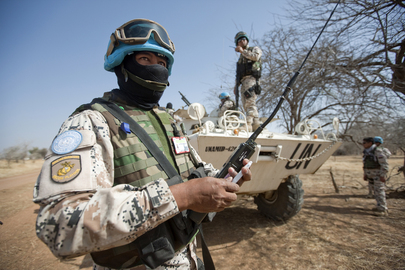A political mission should replace the peace operation in Sudan, a joint United Nations-African Union report has said, sparking criticism from rights groups.
Both UN and AU are later expected to engage in crucial discussions on whether to withdraw some troops from the United Nations-African Union Mission in Darfur (UNAMID). The agency has continued to insist that the Government should take up the primary responsibility of protecting civilians nonetheless, they promised to provide advisory and capacity building support to the authorities in the country.
“If a follow-on mission includes a mandate indicating the physical protection of civilians, such a mandate, which has not been requested to date by the transitional Government of the Sudan, would require a very significant deployment, commensurate with the size of the area of operations. Short of this, a post-UNAMID mechanism would not be in a position to provide such protection and should therefore not be expected to do so. Other protection modalities should be explored, including advocacy, the continued role of the women’s protection networks established by UNAMID, community policing, partnership with humanitarian and human rights groups and potential collaboration with other protection partners, such as the civil society groups practising unarmed approaches to civilian protection,” the report read.
During the post UNAMID period, the organizations recommended establishment of a political and peacebuilding integrated support presence which will be based in Khartoum. The mission’s main role would be to support the country’s transition and human rights monitoring.
The executive director of Human Rights Watch Kenneth Roth feels closing the mission would have devastating effects on people who rely on UNAMID bases for protection.
“Darfur is not like the rest of Sudan. The UN Security Council should recognize that Darfur requires a far more gradual withdrawal and keep a UN security presence on the ground to actively protect civilians. Past and ongoing violence there means civilians can’t trust Sudanese security forces alone and still look to peacekeepers for protection.” he said.
The overall security in Darfur has remained unchanged for years. The report documented deaths of at least 65 people who were killed in a series of violent incidents from 29 December to 1 January. At Sortony, North Darfur 1000 internally displaced persons declined to return to their homes citing safety concerns. A scuffle ensued between security and aid workers resulting to IDP’s looting a clinic and an office ran by the humanitarian workers. UN notes similar incidents occurred in other camps and towns including Zamzam and Kabkabiya.
Children have also borne the brunt of the conflict with UNAMID confirming several cases of abuse. A total of 66 children were killed, raped and maimed from July to January 2020. In Jawa, Eastern part of Jebel Mara security forces have turned schools into military camps forcing some children to stop attending classes.
“The Rapid Security Forces (Janjaweed) and Arab militia attacks in El Geneina affected 24 children, with 11 boys killed, 8 boys and 2 girls injured and 3 girls raped, while 12 schools were destroyed. UNAMID and the United Nations Children’s Fund continued to engage with the armed forces, the Rapid Security Forces and SLA-AW to address these issues,” the report indicated.
UNAMID also recorded a total of ten intercommunal clashes which resulted to 70 casualties. In one particular incident, a personal dispute between an Arab and internally displaced person led to a full-scale assault by armed Arab tribesmen. There were also cases of attacks against farmers by pastoral communities in Saraf Omra, Kabkabiyah, Tawilah and Shangil Tobaya in North Darfur. For instance, Nothern Rizeigat pastoralists have continued to harass and intimidate people from the Fur ethnic group.
The mandate of UNAMID last expired in October 2019, the security council unanimously decided to extend its mission by one year until October 2020.







